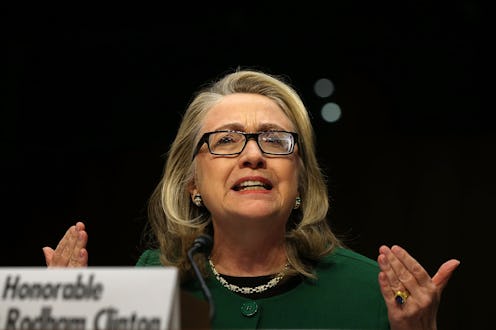News
3 Takeaways From The New Benghazi Emails
A new spat of emails released Tuesday has led some Republicans to declare victory on a long-standing accusation — that the Obama administration misled the public about Benghazi, when a 2012 attack on an American consulate killed four people. The emails, obtained via Freedom of Information Act request by conservative group Judicial Watch, purport to contain evidence of a cover-up. But do they?
After all, if there's one thing that's been laid bare over the last year, it's that the Right have no shortage of fervency or wild-eyed theories about the the Benghazi tragedy. Here are three takeaways from what the emails tell us and don't tell us, and what we can find in between.
1. The White House Agreed With Early CIA Assessments Favorable to Them, And Rolled With It
The core claim being made by the GOP about the emails is that they reveal a concerted effort by officials, specifically White House aide Ben Rhodes, to concoct a false cover about the cause of the attack in order to shield the administration, and ostensibly President Obama, from criticism.
If that narrative can be given any credibility, it's that Rhodes did definitely send an email to a slew of administration figures — David Plouffe, Dan Phieffer, and Jay Carney among them — about prepping then-UN Ambassador Susan Rice to speak about the attack. But the narrative that claims an administration-led deception doesn't necessarily follow.
That's because the central claim Rhodes wants them to play up — Rice's talking points citing protest over an anti-Islam video as the inciting factor — wasn't dreamt up by Ben Rhodes or anybody else in the email chain. That suggestion came from the CIA's assessment hours before.
If the GOP's sole objection was that the administration leaned into a favorable intelligence assessment which played to their favor, that's an extremely legitimate criticism. But the objections haven't always stopped quite that short.
2. We're Still Not Asking The Right Questions About Benghazi
A simple frustration in all this is that the credible questions surrounding Benghazi — questions of intelligence failure; bipartisan congressional budget cuts to consulate security; the rapid-response availability of U.S. forces in the event of attacks in remote locations — are being swept under the table in favor of rehashing of a largely settled and uninteresting question.
And the implications of go well beyond a partisan view of geopolitics — just as the Benghazi attacks occurred under the watch of the Obama administration, so too were several diplomatic missions attacked, with fatal results, throughout the George W. Bush administration.
3. The Benghazi Fever Hasn't Broken Yet, And There's No Telling If It Will
The durable thirst in conservative media for any information that might indict President Obama of impeachable negligence is as strong today as it's ever been, and many of the fringe Benghazi conspiracy theorists attest to that. This proneness to spot conspiracies in tumultuous events isn't necessarily a partisan phenomenon — a staggering number of people, many decidedly left-wing, still believe 9/11 was an inside job, for example.
But at some point in the trajectory of a conspiracy theory, mainstream outlets have to insist on the resources, time and respect for truthful reporting that's necessary to clear up the inaccuracies.
The big problem: if a conservative's go-to mainstream source is, say, Fox News, that's probably not going to happen.
